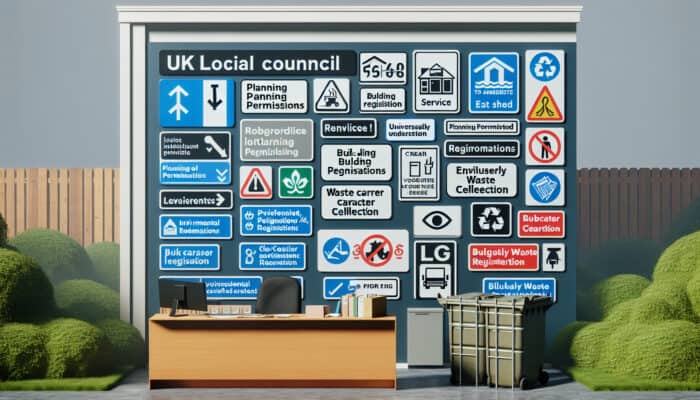Essential Steps for Effective House Clearance in Sunderland
How to Accurately Assess Your House Clearance Needs?

Identifying your house clearance needs is a critical first step in carrying out a successful house clearance in Sunderland. This vital assessment involves taking a detailed look at the types and quantities of items you wish to clear. By thoroughly examining your situation, you can significantly streamline the entire process. Start by considering the size of your property, alongside the condition of your belongings. This comprehensive evaluation will not only assist you in determining the necessary resources for the clearance task but also help you develop the most effective strategy for executing the clearance efficiently.
As you perform your evaluation, keep several key factors in mind. First, compile an inventory of the types of items in your home, which may include furniture, appliances, clothing, and various personal belongings. Next, gauge the volume of these items; a small apartment may require a different approach than a larger house. Then, assess the condition of each item; some may be worth salvaging while others could be disposed of. Don’t forget to consider any sentimental items that might need special treatment. Lastly, factor in your timeline; understanding how urgently you need the clearance completed can greatly influence your decisions.
- Types of items (furniture, appliances, etc.)
- Volume of items in your home
- Condition of items (salvageable, damaged, etc.)
- Sentimental value of specific items
- Timeline for completion
What Are the Best Practices for Organising and Sorting Your Belongings?
Organising and sorting your belongings is a vital stage in the clearance process that can greatly improve the efficiency of your efforts. This structured approach provides clarity and order, making it easier to decide the fate of each item. By categorising your possessions, you can effectively manage the clearance process and ensure that every item is dealt with appropriately.
Begin by creating distinct categories for your items. For example, you might establish a ‘keep’ category for belongings you want to retain, a ‘donate’ category for items still in usable condition, a ‘sell’ category for valuable items you no longer require, and a ‘dispose’ category for anything that is broken or unusable. This method of categorisation not only reduces clutter but also empowers you to make informed decisions about how to handle each item. By employing a systematic approach to sorting, you can avoid the confusion often associated with house clearances.
- Keep: items you want to retain
- Donate: usable items for charities
- Sell: valuable items you no longer need
- Dispose of: broken or unusable items
- Recycling: materials that can be recycled
How to Create an Effective Schedule for Your House Clearance?
Creating an effective schedule is crucial for ensuring a successful house clearance in Sunderland. Planning the timing of your clearance can help you sidestep peak periods, ensuring the availability of services and potentially securing better rates. A well-structured schedule can alleviate stress and ensure that the entire process unfolds smoothly.
Consider conducting your clearance on weekends or during off-peak hours. Many clearance companies offer reduced rates during these times, which can lead to significant savings. Furthermore, booking your clearance in advance can secure your preferred dates and times, particularly if you are working with a busy company. It’s also wise to set aside time for sorting and packing in advance of the clearance day. This preparation can help prevent last-minute chaos and ensure that everything is organised before professionals arrive. Establishing a clearly defined timeline will keep the entire process streamlined and effective.
Expert Insights for Affordable House Clearance in Sunderland

What Are Effective Strategies for Streamlined House Clearance?
Implementing effective strategies for house clearance involves meticulous planning and execution. Adopting a systematic approach can lead to a more efficient and successful clearance process. It’s essential to focus not only on the logistics of the clearance itself but also on the environmental consequences of your choices. Achieving successful clearances often entails partnering with reputable services that can navigate the complexities of waste disposal and recycling.
For instance, a homeowner in Sunderland faced a challenging clearance after a home renovation. They engaged a local clearance service that specialised in environmentally friendly disposal methods, which significantly reduced the environmental impact of their clearance. By planning ahead and researching local companies committed to sustainability, you can ensure a seamless process. Consider seeking recommendations from friends or family, or checking online reviews to find a reputable service that aligns with your needs.
How to Select the Right Clearance Service for Your Needs?
Choosing the right clearance service is vital for achieving a successful house clearance in Sunderland. A competent service can greatly ease the burden of clearing your property while ensuring compliance with local regulations. The key to making an informed choice lies in thorough research and comparing available options.
Start by examining online reviews to assess customer satisfaction with various clearance services. Look for testimonials that highlight reliability, efficiency, and professionalism. Next, compare pricing among several companies to find a service that fits your budget while maintaining quality. Ensure that the clearance service you select is fully licensed and insured, providing an extra layer of protection for your belongings. Finally, don’t hesitate to contact the companies directly to inquire about their procedures and any additional fees they might charge. This proactive approach will help you find a trustworthy and capable house clearance service.
What Costs Should You Prepare for During a House Clearance?

Understanding the costs associated with a house clearance is essential for effective budgeting. Various factors influence the overall clearance cost, including the volume of items to be cleared, disposal fees, and transportation expenses. Being aware of these elements enables you to make informed decisions and avoid unexpected charges.
Typically, clearance services charge based on the volume of waste they need to remove. Naturally, larger volumes will incur higher costs. Additionally, consider any disposal fees associated with specific items, such as furniture or electronic waste, which may require specialised handling. Transportation costs also factor in; if your home is situated in a hard-to-reach area, this could elevate the final bill. To save on expenses, consider implementing strategies like sorting items into categories before the service arrives, as mentioned earlier. This proactive measure can help reduce waste volume and, consequently, overall costs.
Legal and Environmental Factors in House Clearance
What Are the Legal Obligations for House Clearance?
Understanding the legal obligations for house clearance in Sunderland is crucial for ensuring compliance with local regulations. Familiarising yourself with these laws can help you avoid potential fines while ensuring that the clearance process is conducted safely and responsibly. It’s essential to be aware of the relevant laws concerning waste disposal and hazardous materials.
In the UK, waste carriers must be registered and licensed to transport waste. Before engaging a clearance service, verify their credentials to ensure compliance with Environmental Agency regulations. Furthermore, it is vital to distinguish between general waste and hazardous materials. Items such as batteries, chemicals, and electrical appliances require specific disposal methods to prevent environmental harm. By adhering to local guidelines, you can ensure that your house clearance is not only efficient but also lawful and environmentally responsible.
What Sustainable Options Are Available for Your House Clearance?
Eco-friendly clearance options are becoming increasingly popular as awareness of environmental issues grows. Incorporating sustainable practices during your house clearance can significantly lessen your environmental impact while benefiting the community. By exploring eco-friendly methods, you contribute to a healthier planet while decluttering your home.
Begin by evaluating the items you wish to dispose of and look into recycling options. Many local councils provide recycling points for various materials including metal, glass, and paper. Donating usable items to local charities is an excellent way to ensure that your belongings are reused rather than discarded. Additionally, seek out clearance services that specialise in environmentally conscious disposal methods, such as recycling and repurposing materials. This approach not only benefits the environment but can also enhance your reputation as a responsible homeowner.
How to Safely Manage Hazardous Materials During Your Clearance?
Safely managing hazardous materials is a critical aspect of house clearance that should not be overlooked. Hazardous materials, such as batteries, chemicals, and certain electronic items, pose risks to both health and the environment, making proper disposal essential. Understanding how to identify and manage these items will help you navigate your clearance responsibly.
Start by thoroughly sorting through your belongings to identify any hazardous materials. Once identified, never dispose of these items alongside regular waste. Instead, contact your local council to learn about specific disposal methods for hazardous materials in your area. Many councils provide designated drop-off points or special collection services for these items. When handling hazardous materials, always wear protective gloves and ensure proper ventilation. By adhering to safety guidelines and local regulations, you can manage hazardous materials without compromising your health or that of the environment.
Optimising Value Through Selling and Donating Your Items
Where to Sell Unwanted Items in the UK?
Selling unwanted items is an effective way to recoup some costs incurred during your house clearance in Sunderland. The UK offers a wide range of platforms and local markets for selling these items, simplifying the process of finding buyers. Choosing the right venue for your items can maximise your financial returns.
Popular online platforms such as eBay, Facebook Marketplace, and Gumtree allow you to reach a broader audience, increasing the chances of a quick sale. For more specialised items, consider local antique shops or consignment boutiques that focus on particular goods. Additionally, hosting a garage sale can attract local buyers and facilitate quick sales of multiple items. Always research the value of your items to set competitive prices, ensuring they sell without being undervalued.
- eBay: for a wide audience
- Facebook Marketplace: local selling
- Gumtree: easy listings for various items
- Depop: ideal for clothes and fashion items
- Local antique shops: for unique or vintage items
How to Donate Your Items for Maximum Community Impact?
Effectively donating items can be one of the most fulfilling aspects of your house clearance, allowing you to give back to the community while decluttering your home. The key to successful donations lies in identifying the right charities and ensuring that your items meet their specific requirements.
Start by researching local charities that accept donations in Sunderland. These organisations often have particular requirements regarding the types of items they accept, making it essential to understand their needs. Common donation recipients include homeless shelters, food banks, and thrift stores, which often sell donated items to support their programs. Ensure your items are in good condition and clean before donating; this enhances their value and usability for those in need. Furthermore, consider contacting the charity in advance to see if they can arrange a collection service, simplifying the process for you.
How to Accurately Value Your Items for Sale or Donation?
Correctly valuing your items is crucial for ensuring they are directed to the right place, whether for sale or donation. An accurate valuation helps set fair prices and ensures that donated items meet the needs of the charities you aim to support. Assess the condition, rarity, and market demand of each item.
Start by researching similar items online to gauge their selling prices. Websites like eBay can provide insight into current market trends and average prices for comparable items. For donation purposes, consider the item’s condition and how much use it can still provide to someone in need. Items in excellent condition may be suitable for sale, while those that show wear might be ideal for donation. By taking the time to evaluate the value of your items, you can make informed decisions that benefit both you and potential recipients.
What Are the Steps to Prepare Items for Sale or Donation?
Preparing your items for sale or donation is crucial in making them appealing to potential buyers or recipients. The presentation and condition of your items can significantly influence their perceived value and likelihood of acceptance.
Begin by thoroughly cleaning each item, removing dust, dirt, and any stains to enhance its appearance. If applicable, ensure items are functional and in working order; consider minor repairs to improve their appeal. For instance, a chair with a wobbly leg may need fixing to be sellable. When packaging items, especially for online sales, utilise secure and appropriate materials to protect them during transport. Including original packaging, manuals, or accessories can also increase value. By taking these steps, you ensure that your items stand out, whether in a charity shop or an online marketplace.
Research-Backed Advantages of House Clearance in Sunderland
What Psychological Benefits Can You Gain from Decluttering?
Decluttering offers numerous psychological benefits that can enhance your overall well-being. Research suggests a strong link between a tidy environment and improved mental health, indicating that a clutter-free space can reduce stress and boost focus. Engaging in decluttering enables you to create a more peaceful and organised living space.
Taking actionable steps towards decluttering can amplify these benefits. Start with manageable tasks by focusing on one room or area at a time to prevent feeling overwhelmed. Setting specific goals, such as completing one category of items each weekend, can provide a sense of accomplishment and motivate you to continue. Additionally, consider implementing an organisational system tailored to your needs, such as designated storage solutions or colour-coded bins. By transforming your environment, you can foster a mindset of clarity and tranquillity, positively influencing your daily life.
How to Achieve Financial Gains from Selling Unwanted Items?
Selling unwanted items can lead to significant financial gains, aiding in offsetting the costs of house clearance or even generating profit. By being strategic in your selling approach, you can maximise your returns while decluttering.
Evaluate the items you wish to sell and consider their market demand. Established platforms like eBay and Facebook Marketplace allow you to reach potential buyers swiftly, often resulting in significant financial returns. For high-value items, such as electronics or designer garments, consider auction sites or local consignment shops that cater to niche markets. Additionally, hosting a garage sale can provide an opportunity to sell multiple items at once, streamlining the process. By leveraging various selling avenues and setting competitive prices, you can effectively convert your unwanted items into cash.
How to Enhance Your Home’s Value Through Clearance?
Enhancing your home’s value through clearance can create a more appealing space for prospective buyers or renters. A clutter-free environment often appears larger and more inviting, positively influencing market perceptions. By taking the time to clear out unnecessary items, you can have a significant impact on your home’s market value.
Potential buyers are generally more inclined to make offers on homes that look well-maintained and organised. A thorough clearance allows you to present your home in its best light, making it easier for prospective buyers to envision themselves in the space. Consider investing in minor repairs or improvements during the clearance process to further enhance your home’s appeal. By understanding the relationship between clearance and property value, you can make informed decisions that ultimately benefit your investment.
Practical Tips for a Smooth Clearance Experience
How to Pack and Transport Your Items Efficiently?
Packing and transporting items efficiently is essential for ensuring a smooth house clearance in Sunderland. The right approach can save you time, alleviate stress, and reduce the risk of damage to your belongings throughout the process. Establishing a clear packing strategy is key to achieving this goal.
Begin by gathering appropriate packing materials, including sturdy boxes, bubble wrap, and packing tape. Pack items categorically, labelling boxes clearly for easy identification during transport. For fragile items, use adequate padding to prevent breakage; wrapping delicate items in bubble wrap or blankets can provide additional protection. When loading items for transport, place heavier boxes at the bottom and lighter ones on top to ensure stability. To further streamline the process, consider hiring professional movers to handle logistics and heavy lifting. By following these steps, you can facilitate a hassle-free clearance experience.
How to Use Storage Solutions During Your Clearance?
Utilising storage solutions during your house clearance can effectively manage items you wish to keep but don’t need immediately. This approach can reduce clutter and provide the space needed to sort through your belongings at a comfortable pace. Exploring various storage options can help you find the best fit for your needs.
Consider renting a storage unit if you have numerous items that you wish to keep temporarily. Local facilities often offer a range of sizes to accommodate your requirements. Alternatively, consider asking friends or family for temporary storage space. If you only need to store a few items, using your garage or spare room might suffice. As you sort through your belongings, regularly revisit your storage solutions to evaluate what you truly need to keep and what can be sold or donated. Implementing storage solutions can significantly simplify the clearance process, allowing for a more organised and less overwhelming experience.
What Are Your Options for Dealing with Unwanted Furniture?
Unwanted furniture can often present a challenge during the house clearance process, but it also provides numerous opportunities for responsible disposal or reuse. Knowing how to manage these larger items can ease the clearance process while benefiting others in the community.
First, consider selling your unwanted furniture through online platforms like Gumtree or Facebook Marketplace, which cater to local buyers. Alternatively, local consignment shops may accept your furniture if it’s in good condition. If selling isn’t feasible, donating your furniture to charities or local shelters can give your items a second life while supporting those in need. Many charities offer collection services for larger items, making the donation process straightforward. Lastly, if your furniture is beyond repair, explore recycling options or contact your local council for bulky waste collection services. By exploring these avenues, you can ensure your unwanted furniture is handled responsibly and sustainably.
How to Effectively Schedule Your House Clearance Process?
Effectively scheduling your house clearance process is vital for a stress-free experience. A well-constructed timeline allows you to allocate adequate time for each task while coordinating with professionals and ensuring everything is completed efficiently.
Start by setting clear deadlines for each phase of the clearance process. Begin with an inventory of your items, then sort and categorise them. Assign specific days to complete these tasks, ensuring to leave enough time before the actual clearance date for packing and preparation. Communicate with any clearance services you plan to hire to confirm their availability and any specific requirements they may have. To prevent last-minute issues, consider building in extra time to address unexpected challenges, such as needing additional help or discovering more items to clear. A structured schedule will help you stay organised and ensure that your house clearance goes smoothly.
How to Manage Your Paperwork and Documentation?
Managing paperwork and documentation during your house clearance is essential for maintaining order and ensuring compliance with local regulations. Keeping accurate records helps you track what has been sold, donated, or disposed of, facilitating future reference and potential tax deductions.
Start by creating a system for organising your documentation, whether through physical records or digital files. Maintain receipts from sales, donation confirmations from charities, and records of any disposal services you utilise. Consider keeping a checklist of items, noting their status as you progress through the clearance process. This approach not only helps you stay organised but can also provide valuable insights into your decluttering efforts, such as identifying items that may be worth selling in the future. By managing your paperwork effectively, you can create a smoother clearance experience while maintaining oversight of your belongings.
Proven Strategies for Cost-Effective House Clearance in Sunderland
What Are the Most Budget-Friendly Approaches for House Clearance?
Implementing cost-effective methods for house clearance can significantly reduce expenses while ensuring a thorough and efficient process. DIY clearance, hiring affordable services, and selling unwanted items are viable strategies to consider.
One effective strategy is to conduct the clearance yourself, particularly in smaller homes or apartments. This approach allows you to save on professional service fees while providing greater control over the process. However, for larger properties, hiring a budget-friendly clearance service may be necessary. Research local companies that offer competitive rates and positive reviews to find an affordable option. Additionally, consider selling unwanted items online or through garage sales to offset clearance costs. By implementing these strategies, you can achieve a successful house clearance without breaking the bank. Real-world examples show that homeowners who strategically plan their clearances often achieve significant savings while effectively clearing their spaces.
How to Negotiate Effectively with Clearance Companies?
Negotiating with clearance companies can lead to better rates and improved services during your house clearance. Understanding pricing structures and being prepared to discuss your needs will help you secure the best deal possible.
Begin by obtaining multiple quotes from different clearance companies. This will provide you with a benchmark for comparison and give you leverage during negotiations. When discussing prices, be clear about the scope of your clearance and any specific requirements. Companies may be willing to offer discounts for larger jobs or for jobs that offer flexibility in scheduling. Additionally, if you find a lower rate elsewhere, consider using that information to negotiate a better price with your preferred service. By approaching negotiations strategically, you can ensure that you get the best value for your house clearance.
How to Effectively Plan for Future Clearances?
Planning for future clearances involves adopting a system to keep your space organised and regularly assessing your belongings. By taking a proactive approach, you can prevent clutter from accumulating over time, making future clearances less daunting.
Establish a decluttering routine, such as seasonal check-ins where you assess your belongings and determine what can be sold, donated, or discarded. Additionally, consider implementing organisational systems for your home, using storage solutions that simplify tracking items. Communicate with family members about their belongings to ensure everyone is aligned regarding clutter management. Staying informed about clearance services can also prepare you for future needs, allowing you to act quickly when it’s time to declutter again. By planning ahead, you can create a more organised and manageable living environment.
How to Maximise Value from Your Unwanted Items?
Maximising value from unwanted items during your house clearance can turn a potentially overwhelming task into a profitable venture. Identifying valuable items, utilising online platforms for sales, and donating to charity can all contribute to this goal.
Start by evaluating your belongings for items that may hold significant value, such as vintage clothing, electronics, or collectibles. Researching market trends can help you set competitive prices for these items when selling online. Websites like eBay and local marketplaces provide excellent platforms for reaching potential buyers. Additionally, consider donating items that may not sell quickly but are still in good condition; this not only benefits your community but can offer tax deductions in some cases. By taking a strategic approach, you can turn your unwanted items into valuable assets during your house clearance.
Common Challenges and Effective Solutions During House Clearance
How to Tackle Sentimental Items During Clearance?
Handling sentimental items during a house clearance can be emotionally challenging, yet it is a necessary part of the process. Striking a balance between cherishing memories and creating a clutter-free space can be difficult, but with a strategic approach, it is manageable.
Begin by designating a specific area for sentimental items. This allows you to evaluate these items separately without feeling overwhelmed by the entire clearance. Consider setting a limit on the number of items you will keep; this encourages thoughtful decisions about what genuinely matters to you. Additionally, consider photographing items you are contemplating letting go; this helps you retain the memory without the need to physically hold onto them. By implementing these strategies, you can navigate the emotional aspects of decluttering while still achieving your clearance objectives.
How to Overcome Space Constraints During Your Clearance?
Overcoming space constraints during a house clearance can be a significant challenge, particularly in smaller homes. Effective planning and resourcefulness are key to managing limited space while ensuring a successful clearance.
To tackle space issues, start by implementing a systematic approach to sorting and packing. Focus on one area at a time, allowing you to clear that space before moving on to the next. If necessary, utilise temporary storage solutions, such as a rented storage unit or a friend’s garage, to manage items you wish to keep. Take advantage of vertical space, such as shelving and stacking boxes, to optimise your available area. Regularly assess your progress and adjust your strategy as needed. By staying organised and flexible, you can successfully navigate space constraints during your clearance.
What to Do When Facing Time Pressures?
Dealing with time pressures during your house clearance can be stressful, but with effective planning and prioritisation, you can manage your timeline more efficiently. A strategic approach ensures that you stay on track while avoiding last-minute chaos.
Begin by creating a detailed schedule that breaks down your clearance tasks into manageable steps. Prioritise high-priority items that must be addressed first, such as those needing to be cleared for an upcoming move. If time constraints become overwhelming, consider enlisting professional help for specific tasks such as heavy lifting or packing. Additionally, remain flexible and be willing to adjust your timeline if necessary. By establishing clear priorities and being proactive, you can handle time pressures effectively and successfully complete your house clearance.
How to Manage Clutter in Shared Spaces Effectively?
Managing clutter in shared spaces can be challenging, particularly when multiple individuals contribute to the accumulation of items. Effective communication and collaboration are essential to ensure that everyone participates in maintaining a clutter-free environment.
Start by organising a family meeting to discuss clutter management and establish shared responsibilities for keeping areas clean. Encourage each member to assess their belongings and designate specific spaces for them regularly. Implement a system for shared spaces, such as a “one in, one out” policy, which encourages everyone to remove an item when bringing new items into shared areas. Additionally, consider designating specific days for communal decluttering, enabling everyone to contribute. By fostering open communication and collaboration, managing clutter in shared spaces can become a collective effort.
How to Handle Unexpected Items Found During Clearance?
Handling unexpected items discovered during a house clearance can be both surprising and challenging. These items may hold sentimental value or be unfamiliar, complicating decisions about their fate. Developing a systematic approach to managing these items can help you navigate this situation.
When you come across unexpected items, take a moment to assess their condition and potential value. If the item is in good condition, consider whether it can be sold or donated. For items with sentimental value, determine if it’s worth keeping or if you can take a photograph or video to remember it by. If you’re uncertain about any items, consider setting them aside for further evaluation. This allows you to maintain momentum during the clearance while ensuring you don’t overlook potentially valuable or meaningful items. By implementing a thoughtful strategy, you can efficiently handle unexpected discoveries during your clearance.
Post-Clearance: Vital Next Steps
How to Maintain a Clutter-Free Home After Your Clearance?
Maintaining a clutter-free home after clearance is vital for preserving the results of your efforts. Establishing regular decluttering habits and organisational systems will help prevent clutter from accumulating again, creating a more peaceful living environment.
Begin by implementing a decluttering routine, such as seasonal evaluations, where you assess your belongings and decide what to keep and what to dispose of. Create designated storage solutions for your belongings, ensuring that everything has a specific place. Encourage mindful purchasing: before bringing new items into your home, consider their necessity and whether they enhance your space. Involving family members in this process can also promote a collective mindset towards maintaining a tidy home. By adopting these practices, you can enjoy a clutter-free environment long after your initial clearance.
What Are the Most Effective Methods for Disposing of Remaining Items?
Disposing of remaining items after your house clearance is crucial for ensuring a responsible and efficient process. Proper disposal methods not only comply with local regulations but also minimise environmental impact, making it essential to handle remaining items wisely.
Start by categorising leftover items into appropriate disposal methods. For items in good condition, consider donating them to local charities or community organisations. For items that cannot be reused, research local waste management services capable of handling recycling or bulky waste disposal. Many local councils offer specific collections for large items, so be sure to check their guidelines. Additionally, consider recycling materials wherever possible, such as cardboard and plastics. By utilising responsible disposal methods, you can ensure that your remaining items are handled ethically and sustainably.
How to Celebrate Your Clearance Success?
Celebrating your clearance success can be a rewarding and motivational aspect of the process. Recognising your achievements helps you appreciate the effort you’ve put into decluttering and can provide a sense of closure as you move forward.
Consider planning a small gathering with family or friends to showcase your newly organised space, or treat yourself to a reward such as a day out or a special meal to celebrate your accomplishment. Documenting the before-and-after transformation through photographs can serve as a visual reminder of your success and motivate you to maintain the progress you’ve made. Reflecting on your clearance achievements can reinforce positive habits and encourage ongoing efforts towards a clutter-free lifestyle.
Frequently Asked Questions
What is the typical cost of house clearance in Sunderland?
The typical cost of house clearance in Sunderland generally ranges from £100 to £600, depending on the volume and type of items to be cleared.
How long does a house clearance generally take?
A house clearance can take anywhere from a few hours to a couple of days, depending on the size of the property and the amount of clutter.
Can I carry out a house clearance myself?
Yes, you can conduct a house clearance yourself, especially for smaller spaces. However, consider hiring professionals for larger clearances or heavy items.
What should I do with unwanted furniture?
Unwanted furniture can be sold, donated to charities, or recycled. Check with local charities for collection services if needed.
How do I find a trustworthy clearance service?
Research local clearance services, read reviews, and ask friends or family for recommendations to find a reliable service.
Are there any tax benefits for donated items?
In the UK, you may be able to claim tax deductions for donated items, but ensure you keep records of your donations.
What should I do with hazardous materials?
Hazardous materials should not be disposed of in regular waste. Contact your local council for disposal guidelines and services.
How can I maximise profits from unwanted items?
Maximise profits by researching market values, using online platforms for selling, and hosting garage sales to reach local buyers.
Is it necessary to hire a clearance company?
Hiring a clearance company can simplify the process, especially for larger properties or for heavy items that require special handling.
How can I maintain a clutter-free home after clearance?
Maintain a clutter-free home by implementing regular decluttering routines, creating designated storage solutions, and practising mindful purchasing.
Connect with us on Facebook!
The Article: Sunderland House Clearance: Affordable Tips for UK Homes Was First Found At https://birminghamhouseclearance.com
The Article House Clearance in Sunderland: Budget-Friendly Tips for Homes Was Found On https://limitsofstrategy.com
References:
House Clearance in Sunderland: Budget-Friendly Tips for Homes



